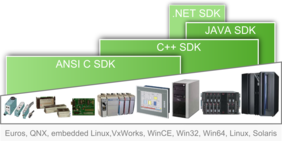Schwabach, April 2012. Unified Automation announces a new family of products that accelerate the use of the communication standard OPC UA on Windows based systems having a .NET environment. For the trade show HMI in Hannover, Germany the first product—the “.NET based OPC UA Client SDK”—will be shown as Technical Preview. Following its tradition of professional OPC UA toolkits Unified Automation now offers a solution for the large area of .NET applications. The final release date of the Client SDKs is planned for end of April. In fall this year the second product, the Server-Edition, will follow.
With the .NET SDK you can quickly program effective and professional OPC UA applications. Integration in existing .NET applications like HMI and SCADA solution for example, is extremely easy. Professional design, consistent interfaces combined with understandable documentation and loads of examples describe the strength of this toolkit.
Most of today’s .NET toolkits are based on the sample code of the OPC Foundation. After a detailed analysis of this codebase, Unified Automation decided for some extensive improvements. The client API was redesigned and simplified, additionally the new design was consistently applied to all OPC UA Services and by this the usability and maintainability was significantly improved. The know-how from many implementations and especially from the since years successful C++ and ANSI C based SDKs was incorporated into the new product line. Professionally maintained and supported the .NET based OPC UA SDK offers a native development framework that enables providers of industrial software- and system solutions a confident, seamless integration of OPC UA technology into their products.
“With this new products we are worldwide the only supplier of OPC UA development frameworks in all programming languages”, says Juergen Boxberger, Executive Director of Unified Automation. “Besides C++, ANSI C and Java the product family of our new .NET SDKs for client and server closes the gap at professional OPC UA toolkits.”
The .NET based OPC UA SDK/Toolkit architecture is simple and consists of two assemblies, whereas the C# Base Library is used for both Client as well as Server implementations. This library contains the UA .NET communication stack of the OPC Foundation and it encapsulates common functions. For the client respectively the server-side there is a specialized application library which contains the interface to the user application.
Especially for the upcoming .NET based OPC UA Server SDK a support for code generation through the UaModeler is planned. Same as for C++ and ANSI C with this tool a modeling of the address space is possible it can generate C# code. The generated code is used directly in the SDK. Therefore programming becomes extremely time effective and the quality is significantly improved. The .NET SDKs will be available as binary developer license, no further runtime licenses required.


